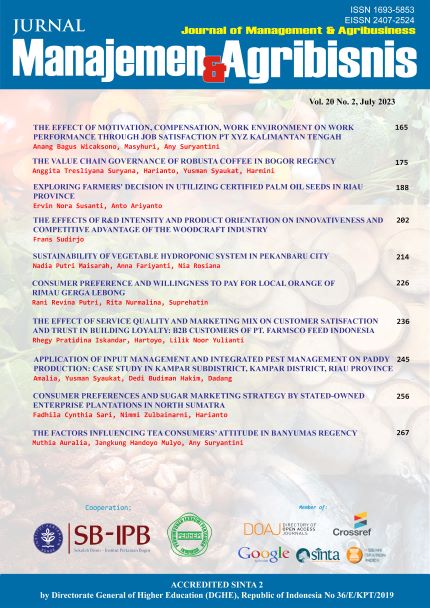Abstract
The governance structure is critical in coffee value chain development. An effective coffee value chain governance is expected to improve efficiency, reduce costs, and increase innovation while benefiting consumers and society. This research aims to analyze the governance structure of the robusta coffee value chain in Sukamakmur District, Bogor Regency, West Java. The study employed survey data from 41 actors along the robusta coffee value chains. Kind of actors are farmers, intermediaries, and downstream actors. The data was analyzed using Gereffi’s value chain mapping and governance analyses. The study revealed that the robusta coffee value chain actors consist of farmers, small-scale traders, large-scale traders, regional traders, coffee processing companies, retailers, roasteries, and cafés. Every actor along the coffee value chain has different activities that add value and differentiate the coffee products. The findings indicated that the Robusta coffee value chain governance is categorized as market governance with low information complexity, high information codifiability, and high supplier capability. To strengthen the governance, it is necessary to establish a partnership with downstream actors and carry out intervention from lead firms, to improve coordination among value chain actors and increase coffee quality.
Keywords: chain actor, coffee value chain, lead firm, market governance, robusta coffee
Authors
Authors who publish with this journal agree to the following terms:
- Authors retain copyright and grant the journal right of first publication with the work simultaneously licensed under a Creative Commons Attribution License that allows others to share the work with an acknowledgement of the work's authorship and initial publication in this journal.
- Authors are able to enter into separate, additional contractual arrangements for the non-exclusive distribution of the journal's published version of the work (e.g., post it to an institutional repository or publish it in a book), with an acknowledgement of its initial publication in this journal.
- Authors are permitted and encouraged to post their work online (e.g., in institutional repositories or on their website) prior to and during the submission process, as it can lead to productive exchanges, as well as earlier and greater citation of published work (See The Effect of Open Access).

